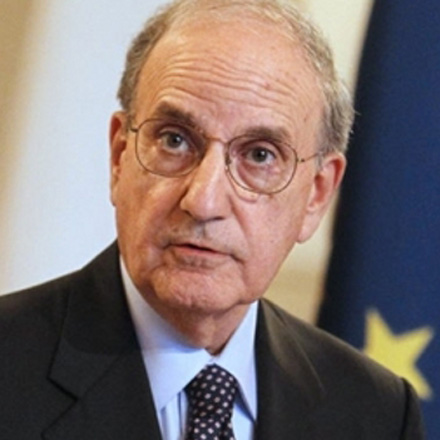US envoy to the Middle East George Mitchell assured Lebanese officials on Friday that there will be no regional peace settlement at Lebanon's expense, dpa reported.
"Without Lebanon, there will not be comprehensive peace in this region," Mitchell was quoted as saying after meeting Lebanese President Michel Suleiman.
The US envoy stressed that settlement of the Palestinian issue would not come at Lebanon's expense.
"The United States does not and will not support the forced naturalization of Palestinian refugees in Lebanon," he added.
"The United States has great respect for Lebanon's sovereignty and for Lebanon's role in comprehensive peace," Mitchell said.
There are some 367,000 Palestinian refugees living in 12 refugee camps across Lebanon, amid miserable conditions. There are fears that any Mideast peace deal could result in their right to return to Palestinian territories being revoked, leaving them no choice but to remain in the camps.
Mitchell, who was accompanied by US ambassador to Lebanon Maura Connelly, also discussed US-Lebanese bilateral relations with Suleiman.
The US envoy, who arrived in Beirut late Thursday, also went to southern Lebanon Friday, where he visited the headquarters of the United Nations Interim Forces in Southern Lebanon (UNIFIL) and met with top officers.
UNIFIL's deputy Spokesperson Andrea Tenenti told the German Press Agency dpa that "Mitchell's talks with UNIFIL only touched on issues related to the UN mission in south Lebanon."
Asked if Mitchell touched on the issue of Hezbollah weapons in Southern Lebanon, Tenenti said: "the US official only was briefed on the UN activities in south Lebanon."
The Lebanese Shiite Movement Hezbollah, which fought a devastating 33-day war with Israel in 2006, has been accused by Israel of stockpiling weapons in southern Lebanon.
UN Security Council resolution 1701, which ended the 2006 war between Israel and Hezbollah, calls for the disarmament of all militant groups in Lebanon, including Hezbollah.
Hezbollah has refused to hand over its weapons, claiming the weapons are needed to protect Lebanon from any possible Israeli aggression.
Also Friday, Mitchell met with Lebanese Defense Minister Elias Murr and Army Commander General Jean Qahwaji.
Last month, the US suspended 100 million dollars in US military assistance to the Lebanese army, out of fears that Hezbollah, which is backed by Iran, would manage to get hold of US-supplied weapons for use against Israel.
The freeze by the US has angered Lebanese officials and prompted Murr to announce that he will refuse any conditional US military assistance to the Lebanese army.
"If someone would like to help the army without restrictions or conditions, he is welcome," Murr said at the time.
On his arrival from Damascus late Thursday, where he held talks with Syrian President Bashar al Assad, Mitchell met parliamentary Speaker Nabih Berri and members of Prime Minister Saad Hariri's cabinet.
Lebanon is still technically at war with Israel. The US administration is hoping to convince both Syria and Lebanon to enter into negotiations with Israel.
Israel Prime Minister Benjamin Netanyahu and Palestinian President Mahmoud Abbas kicked off a second round of peace talks this week, after relaunching US-brokered direct negotiations on September 2 following a 20-month hiatus.
In Damascus, Mitchell said "A comprehensive peace in this region includes a peace agreement between Israel and the Palestinians, between Israel and Syria, and between Israel and Lebanon, and the full normalization of relations between Israel and its neighbours."
The Washington envoy was making his fourth trip to Damascus since US President Barack Obama took office. His visit came three days after France's Special Mideast envoy, Jean-Claude Cousseran, met al- Assad in the Syrian capital and was in Jerusalem for talks with officials there.
Syrian Information Minister Mohsen Bilal said his country's key demand was the return to Damascus of the water-rich Golan Heights region, which was captured by Israel in the 1967 Arab-Israeli War.






